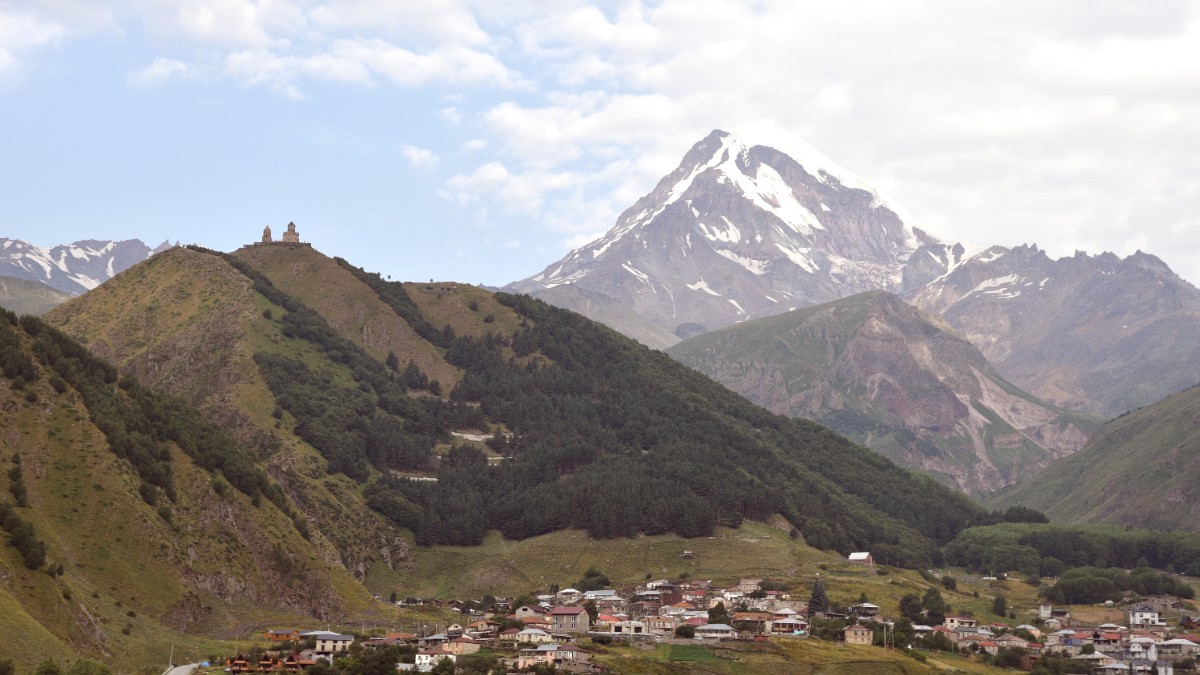
Georgia
Summer (June-September): Pleasant conditions. Daytime temperatures in Mestia 15-25°C (59-77°F). Higher elevations are cooler. Moderate rainfall, often in short, heavy bursts. Humidity is moderate. Air feels crisp and clean.
Winter (December-April): Cold and heavy snowfall. Temperatures often below freezing, 0 to -10°C (32-14°F) in Mestia. Roads to remote villages may close. Expect biting winds at higher altitudes. Spring (May): Cool and wet. Temperatures 5-15°C (41-59°F). Snowmelt makes trails muddy. Weather is unpredictable with frequent rain. Autumn (October-November): Temperatures 5-15°C (41-59°F). Less precipitation than spring or summer. Risk of early snow increases at higher altitudes by late October and November.
Hiking & Trekking: Mid-June to mid-September. Trails are typically snow-free, rivers crossable, and guesthouses on trekking routes operate fully.
Skiing & Snowboarding: January to March. Optimal snow conditions at Hatsvali and Tetnuldi ski resorts. Cultural Exploration (without extensive hiking): May, early June, or October. Cooler weather, smaller crowds permit comfortable exploration of Mestia, Ushguli (if accessible), and local villages.
Be aware of potential mountain dangers.
A clear morning can become an afternoon thunderstorm. Pack rain gear and layers.
Possible during heavy rain or snowmelt, impacting roads. Avalanche risk in winter backcountry.
Safety tips for high-altitude environments.
Drink plenty of water to combat dehydration at altitude.
Sun's intensity is higher; use sunscreen, hat, and sunglasses.
Before and during your journey.
Check local weather forecasts regularly.
Monitor local news for updates on road access, specifically after bad weather.
Svaneti does not experience monsoons or hurricanes. However, mountain weather presents its own set of challenges. Sudden weather changes are common, even in summer. A clear morning can quickly turn into an afternoon thunderstorm.
Snowfall can occur at higher elevations unexpectedly, even in late spring or early autumn. This may impact hiking plans or road access. Landslides and rockfalls are possible during heavy rain or rapid snowmelt, especially affecting roads into and within the region.
Avalanches pose a risk in high mountain terrain during winter and early spring. Travel with experienced guides and safety gear.
Pack layers and rain protection regardless of the season. Dress adaptable to quickly changing conditions.
Always check local forecasts before and during your travel.
Monitor road conditions for potential closures or difficulties.
Staying well hydrated is always important in mountain environments.
Georgia has a generous visa policy. Citizens of over 90 countries may enter visa-free for periods from 90 days to 1 year.
Many nationalities, including citizens from the EU (1 year), the US (1 year), the UK (1 year), Canada (1 year), Australia (1 year), and New Zealand (1 year), enjoy visa-free entry.
Prepare your documents carefully for smooth entry into Georgia.
Costs vary based on your travel style and preferences.
The official currency of Georgia is the Georgian Lari (GEL). Its subunit is the Tetri, with 1 GEL equaling 100 Tetri.
Approximate daily cost breakdown:
Guesthouse (basic, shared bath): 30-50 GEL (per person, often with breakfast). Guesthouse (private bath, half-board): 60-100 GEL (per person, with breakfast and dinner). Mid-range hotel: 120-250 GEL (double room). High-end hotel: 300+ GEL (double room). Local bakery: 3-8 GEL. Budget eatery: 10-20 GEL. Mid-range restaurant: 25-50 GEL. Upscale dining: 70+ GEL.
Marshrutka (Tbilisi-Mestia): 40-50 GEL. Marshrutka (Kutaisi-Mestia): 30-40 GEL. Shared Jeep (Mestia-Ushguli, per person): 40-60 GEL (one-way). Short taxi in Mestia: 5-10 GEL. Hatsvali Cable Car: 15-20 GEL (round trip). Svaneti Museum: 10 GEL. Mikhail Khergiani House Museum: 5 GEL. Church entrance: Free (donations appreciated).
Not strictly mandatory, but appreciated. 5-10% in restaurants (check for service charge). Round up taxi fares. Small gratuity for guesthouse hosts.
Opt for guesthouses with half-board for excellent value and authentic meals.
Utilize marshrutkas and shared jeeps for cheaper travel.
Eat at local bakeries for inexpensive, authentic meals.
Carry enough cash for smaller villages and guesthouses where card payments are rare.
Your well-being during your Svaneti adventure holds high importance.
Consult your doctor. Hepatitis A and Typhoid are generally recommended. Rabies may be considered if animal interaction is probable.
Mestia (1,500m) and Ushguli (2,100m) are moderate altitudes. Acclimatize gradually, hydrate well, avoid alcohol and strenuous activity on arrival.
Drink bottled or filtered water. Practice good hand hygiene. Consider a LifeStraw or purification tablets for hikes.
Always carry a personal first aid kit. Tailor it for a mountain environment.
Include pain relievers, antiseptic wipes, bandages, blister plasters (like Compeed), anti-diarrhea medication (such as Imodium), and Electrolyte tablets.
Pack prescription medications in original packaging with a doctor’s note. Consider antihistamines, motion sickness remedies (like Dramamine), cough drops, and a mild laxative. Use High SPF sunscreen, Wide-brimmed hat, and Insect repellent.
Find first aid supplies at Adventure Medical Kits.
Mestia has a small clinic for basic emergencies. Severe conditions may prompt transfer to a larger city.
Georgia's unified emergency number is 112. This connects you to Police, Fire, and Ambulance services. English-speaking operators are generally available.
Svaneti is very safe for tourists. Violent crime is rare. Petty theft is uncommon, but general precautions for valuables are wise. No "no-go" neighborhoods.
Be aware of potential natural risks in a mountainous environment.
Knowing who to contact in an emergency is always wise.
Dial 112 for Police, Fire, and Ambulance services across Georgia.
Keep contact information for your country's embassy or consulate in Tbilisi.
Often your best local resource for immediate assistance or advice. They can help with local communication.